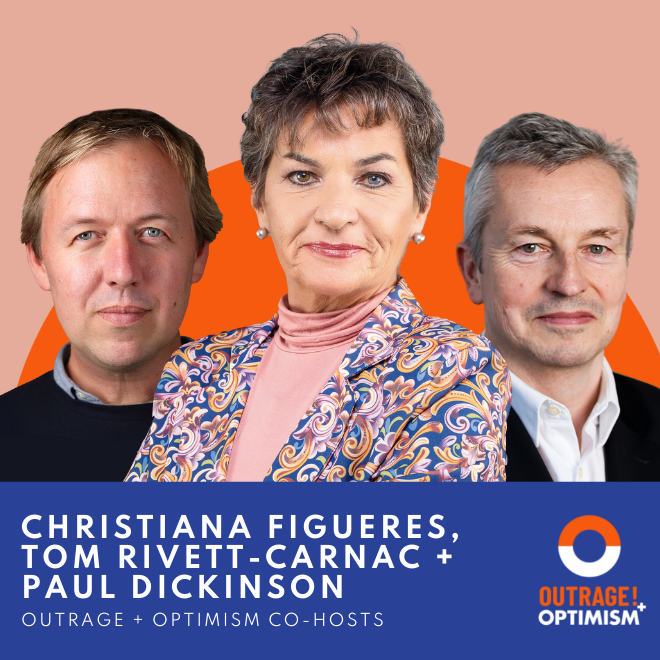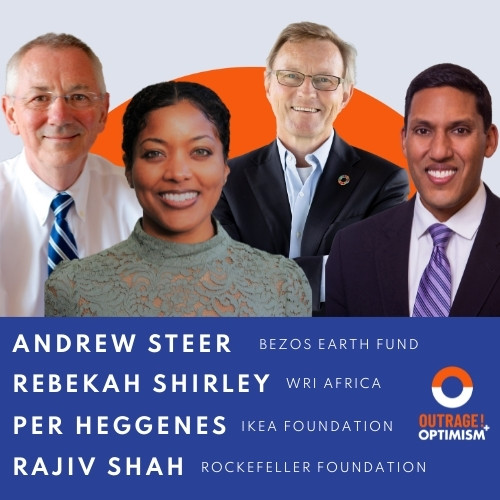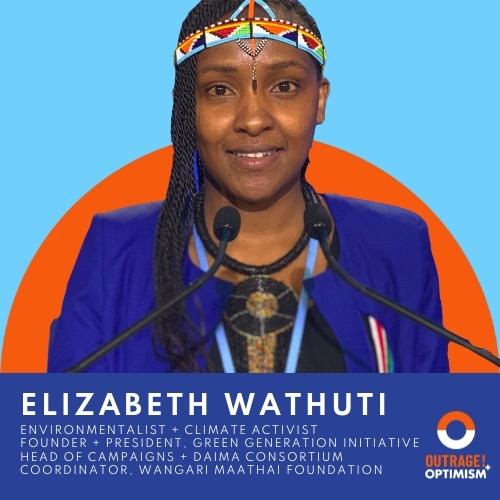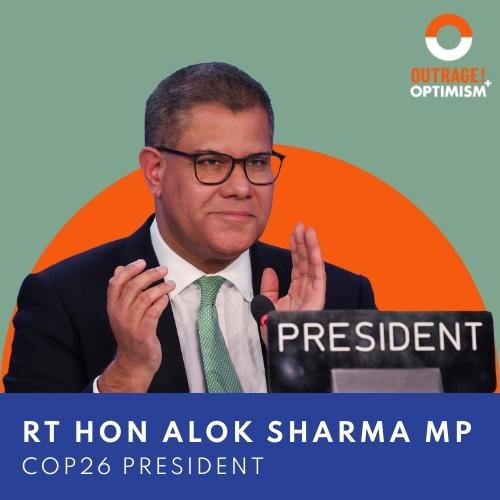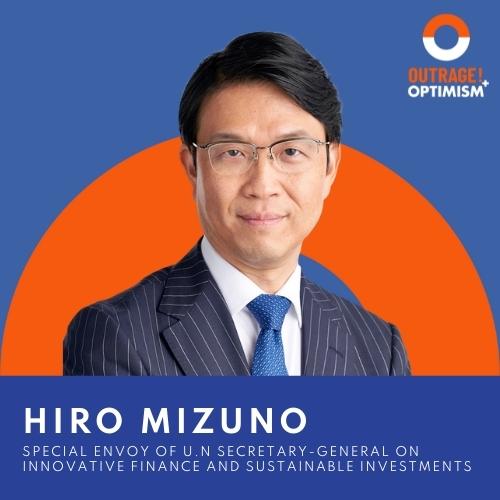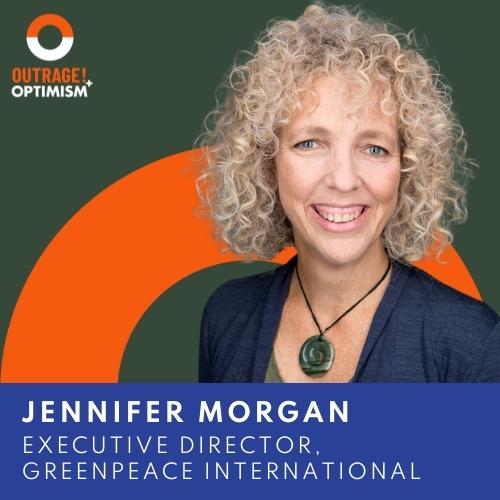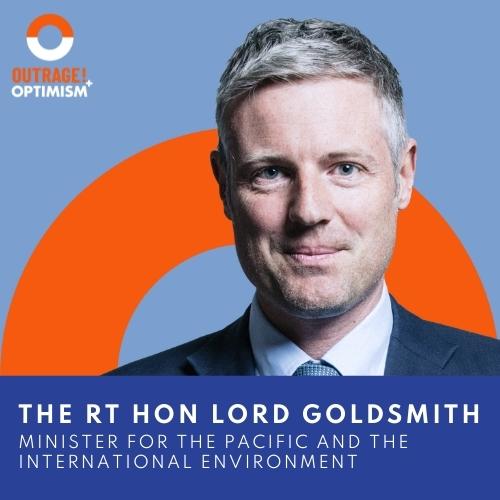128: COP26 Halfway Point: A City of Two Tales With Nigel Topping
One week down, one to go.
About this episode
It's the halfway point of the COP26 climate discussions in Glasgow, UK! Pledges over the past week from world leaders could be transformational, keeping the Paris Agreement's ambition in reach. The devil is in the detail of delivery and, As we head into the second week of the negotiations, government Ministers and negotiators get down to business, with final agreements due to land on Saturday this week. Momentum from the pledges of the past week reverberated around the world, yet the youth movement, alongside many of the most vulnerable nations showed how much further we have to go.
On this episode we take stock with a great friend of the show, the UK's High Level Climate Action Champion, Nigel Topping.
Start your week with our digest of what's happened and what needs to happen next.
Full Transcript
Transcript generated by AI. While we aim for accuracy, errors may still occur. Please refer to the episode’s audio for the definitive version
Tom: [00:00:23] So it's about seven o'clock in the morning, I'm walking along the incredibly quiet streets of Glasgow, where the march was yesterday, they're strewn banners everywhere and it's pretty tidy, but there's a few things left over you can definitely see there is evidence of lots and lots of people here yesterday, 150,000 many are estimating for this March, which was amazing. And I am making my way through the streets into the climate negotiation centre. It's early in the morning. We were all up pretty late last night. The inevitable middle of the week parties. It's Sunday morning. So this is basically the only sort of off day in the middle of the cop where it's not really an off day. And I'm going to find my way in and I'm going to find my friend Nigel, Nigel Topping the high level climate action champion. And I want to find out from him, how do we think about where we are now halfway through the cop? It really has been a city of two tales. The story on the inside has been full of optimism and commitment and claims that we're if not there, then certainly bending the curve towards where we need to be. And on the outside, it's been met with this sense of it's all hot air, it's all blah blah blah. You say these things and then you don't do them and you can see why that's being said. I mean, this is certainly not the first time countries have come together and make big commitments. And in general, they've not been met in the way that it's been claimed that they would do. So, Nigel's right in the heart of that. He is close to what's going on and is close to the numbers. How do they add up? So that's what I want to talk to him about.
Load MoreLet me go through security. Hey. Do I have to go, sorry to interrupt your breakfast? Do I go this way to get to the Crown Plaza? Yes. Oh, it's nice and calm here today, isn't it? Now inside the venue, it's those listeners who haven't been here, it is vast. I mean, all kinds of big, but this one is really big and it's all in one great, big, long line. He's got it from one end to the other. It takes a good 15 minutes at all to walk from side to side. Got a mask on, of course. So I have to go through a few more layers of security to get to the Crown Plaza.
Nigel Topping: [00:02:51] It's so good to see you. Are we recording? Were you recording when I was saying all the bad things about all the good people?
Tom: [00:02:55] No, I unfortunately only just managed to press the record button.
Nigel Topping: [00:02:56] But so I've got a big hammer. I'm going to smash that thing of you.
Tom: [00:03:02] No i’m not that kind of reporter yet.
Nigel Topping: [00:03:04] Everyone’s lovely.
Tom: [00:03:05] Everyone's lovely, quote from Nigel Topping.
Nigel Topping: [00:03:07] Even the people I said other things about earlier.
Tom: [00:03:12] It's so good to see you. I've been seeing you rushing around the clock. Actually, no, that's not true. You have not been rushing around the corridors. And in fact, that's been very impressive. I've seen you walking mindfully through the corridors.
Nigel Topping: [00:03:21] It’s because you know, we have our two Zen monk brothers and our support team, and they've got a whole support team back in Plum Village.
Tom: [00:03:30]. They're amazing.
Nigel Topping: [00:03:31] It's really lovely because we have two Zen Brothers with us and they have a whole support team. They call it mission control in Houston, in Plum Village, and they've just come here in service of what we're all in service of but because they're not involved in any of the processes, and it's interesting just knowing that they were coming,
Tom: [00:03:55] Calmed you down?
Nigel Topping: [00:03:56] Yeah. And it made me think, you know, we have to have offices at one end with the UN offices and then all of the action zones at the other end.
Tom: [00:04:02] Yeah, which is about two miles apart.
Nigel Topping: [00:04:05] So the there might be a natural tendency to try and sprint whilst reading phones and bumping into people.
Tom: [00:04:10] Which gets everybody stressed if those who are in positions of decision making look stressed in the corridor. It's amazing the impact it has on people.
Nigel Topping: [00:04:16] Yeah, so now I just try and give myself enough time to be able to walk. Yeah, calmly from one end to the other and actually enjoy bumping into many old friends. Not do that thing where you've already walked past someone when you say bye, I love you, so to speak to you later. Yeah, yeah, yeah. We try and start all of our meetings with a minute's silence and we had them join a big round table with a lot of civil society leaders yesterday just to try and keep us all grounded.
Tom: [00:04:48] The energy tends to like rise up, doesn't it, and gets kind of breathless.
Nigel Topping: [00:04:52] It does breathless yes.
Tom: [00:04:53] Yeah. So I mean amazing because I have to say when I've seen you walking around calmly it's good, you know, it makes a difference.
Nigel Topping: [00:04:58] It's funny saying earlier that people, a lot people come up to me says, How are you? How are you? You must be exhausted. And I say, no, I’m alright. I'm not. I'm really well. I'm not exhausted. I'm looking after my sleep. Most important nourishment we can get and it's off over halfway through now. I'm feeling good.
Tom: [00:05:17] Over halfway through. And it's I mean, it's an interesting broader point, and it's certainly been true of these climate negotiations that outcome, maybe it's because we haven't done what we've wanted to do in these things, but achievement is equated with exhaustion and stress rather than outcomes. That's part of the problem. It should not be.
Nigel Topping: [00:05:33] Yeah, well, you know, we talked a lot about systems change, and what I notice is that. Systems have a tendency to seek coherence at every level, so at the macro, the mizo and then at the individual. So one thing I just noticed this week was that, you know, our current system is basically based on rapid overconsumption. That's one of the things that we're trying to reverse, right? Sure, you could change the economic models so that they work within planetary boundaries, so the growth at all costs is not rewarded, especially physical throughput growth. And then I notice a tendency when we put on an event. So somebody who's working towards that stable economic future within planetary boundaries that the approach of the event will often be to cram as many possible people again. So we have eight people in the panel and twenty three speakers in one hour. And I just noticed, oh, that's just another.
Tom: [00:06:23] Workshop manifestation of the thinking behind capitalism. Absolutely.
Nigel Topping: [00:06:26] Yeah, exactly. So we have over consumption built into a panel and then that panel becomes stressed and everyone's rushing. And we just have to let go of the fact that you can't have everything at once all the time. And if we had half as many people in some of those sessions, it would be calmer and more informative and more interesting and more engaging instead of just more stress.
Tom: [00:06:50] Now I want to ask you, so it's Sunday morning, we’ve just had breakfast in the Crowne Plaza, in the blue zone. And I want to ask you, how should we think about what's happened so far? I mean, I've obviously had a very different view of it from you, but it just seems so much a city of two tales. You know, there's been amazing announcements, actually incredible and culminating in the realization that if fully implemented. Everything that's happened thus far after the first week would keep us to one point eight degrees. And honestly, if we'd known in twenty fifteen, we'd get to this point by now would have bitten your arm off, right? This is incredible progress from then. At the same time, you know, I was at the march yesterday and I've spoken to many who were involved in the civil society movement. And people are like, this is all bullshit. These promises have been made before. We're back at the table, we're saying the same things. Nothing's different. When are you going to stop greenwashing and wake up? So. And it's quite weird to see how those two poles get pulled apart. So how do you think about that?
Nigel Topping: [00:07:54] Well, first of all, I think recognizing that both of those realities are here, that on the one hand, there is a massive increase in ambition and commitment from governments, investors, businesses, cities, states and regions. I went to a dinner last night with the under two coalition, which is going to become a net zero coalition. That's nearly three hundred states and regions from Scotland to Baden-Württemberg and KwaZulu-Natal to California to Chongyang province in Korea. Half of the world's economy and a quarter of the world's people, a pretty significant group right, are going to their General Assembly today where they'll adopt that sort of new membership criterion. So there is real momentum at every level of government and in the real economy. And there’s real rage, frustration, skepticism. Justified because we're at COP26 and the emissions are still rising. So the question is how does that dichotomy get bridged? And does the elastic band snap?
Tom: [00:09:03] And what happens if it snaps.
Nigel Topping: [00:09:04] What happens if it does? Or do we pull it together? I mean, one of the dangers of the sort of bubble world of social media is that everyone, just everyone, knows they're right whilst pursuing different realities. So I'll give you one example: there's massive rage at a perceived total reliance on offsets to deliver all the promises.
Tom: [00:09:26] Really one of the flashpoint topics here.
Nigel Topping: [00:09:28] But you know, we in the race to zero, which Gonzalo, my fellow high level champion I run, we now have over 8,000 organizations in that and one of the very clear criteria for those who can be bothered to read, is that you can't rely on offsets to claim that you're on a net zero science based trajectory. So what I realize is we have to really find ways to have conversations between people who hate each other. That's hard, right? Because they don't necessarily even want to be in the same room. We tried it. When the race to zero started really picking up, we started getting a lot of net zero is not zero and, you know, greenwash bullshit blah blah blah.
Tom: [00:10:10] It’s a good statement, blah blah blah, because it's very well used.
Nigel Topping: [00:10:13] Yeah, but it applies on both sides. I mean, if you say, you know, net zero is not zero, sorry but that's blah blah blah. Right, right. Net zero is the scientific definition of what we need to get to. Net zero is enshrined in the Paris Agreement. So of course we held a public conversation with some of the loud, strident, critical voices, not to try and justify but to try and understand. And the anger behind net zero, blah blah blah is justified, it's based on a real concern that people will take the phrase net zero and use it to greenwash. So they'll set 2050 targets and do nothing. They'll commit to buying lots of cheap offsets and do nothing. I mean, basically it's all about the concern that people will say something and do nothing. Now if you look at what we've done in the race to zero, it's about having to set the long term target because that's what Paris is about and we're trying to get to net zero in the twenty forties, as we call it a race for a reason. Then if I set a short term target, right, so if you're the CEO or the mayor, you've got to set a target that you're responsible for in a camp on your watch. And then you've got to lay out the plans and then you've got to publish your progress and you can't. And it's got to be all scopes and you can't rely on offsets. So that's the real challenge now is how to bridge the bridge, those two tails. And we won't we won't emerge from Glasgow with one happy clappy tail where everyone agrees. But my hope would be that we emerge with a realization that something really amazing has happened. That the promise of the Paris Agreement is being delivered. We're seeing a ratchet, that's one of the fundamental, I mean, I say there's three bits of genius in the Paris Agreement on many, but which give it redundancy in terms of mechanisms for increasing ambitions. So you've got the NDC, the national government plans which have to come back every five years and be more ambitious. I think we've now got 90 percent of the world economy committed to net zero by mid-century. I know that includes China 2060 and India 2070, but you know, China has always under promised and over delivered.
Tom: [00:12:21] And the India commitment contains incredible commitments to be delivered in this decade, right? So there are other things in there.
Nigel Topping: [00:12:26] Exactly. My view of my reading is that India will also get to net zero by 2050. They just don't want to say it now.
Tom: [00:12:30] Politically it is not possible to do that domestically.
Nigel Topping: [00:12:32] But 500 gigawatts of renewable power, 50 percent renewables by 2030, what will be the biggest country by population in the world then. That's really impressive. And that's a very big deal. So then and then you've got the long term strategies, also part of the Paris Agreement. And we've seen that already that often when a country politically maybe can't talk much about short term policy, there's still enough freedom to talk about a long term plan. And then there's the welcoming in of the non-state actors, the cities, the businesses, the investors, the states and regions. So what we're seeing here is all three of those ratcheting, ratcheting, ratcheting and influencing each other. You know, we talk about the ambition loop so that that's real. And yes, it's all about implementation now. But we're already seeing money flowing into solutions. If you look at, say, green steel or green hydrogen, too much vaunted and much needed solutions. A year ago, very little real money was committed. Now, tens of billions of real money is committed. People are building green steel plants. People are investing in green electrolysis of water to create green hydrogen. People are committing to green shipping lanes. They're committing to significant volumes of sustainable aviation fuel. They're committing to an accelerated transformation to electric vehicles. They're committing to phasing out coal, and none of it is enough. Yeah, but Gonzalo has a great phrase, he says, we need to look at the movie, not just the still. Because if you look at the snapshot you tend to focus on all the gaps in the problems. If you look at the trajectory, you know, before Paris, we were on something like a six degree trajectory after Paris, more like four degrees. Coming into Glasgow, two point seven. Maybe, and then the key is, if all implemented, maybe we've broken the two degree barrier. Yeah, now and and if we can update plans much more regularly than every five years maybe we can be within sharing distance of 1.5.
Tom: [00:14:31] I just want to stay on this thing for a bit because like, for example, one of the things that's come out this week that I think has been most remarkable has been the forest commitments, right, which has been in enormous amounts of preparation. And it's incredibly cleverly constructed, right, because it's 100 countries that have committed to halting and reversing deforestation by 2030. But it's backed up by a whole range of other supporting commitments by other stakeholders like investors who are going to shift capital. And, you know, agricultural commodity companies are going to change their supply chain. So if you look at that and if you study it, I spent a bit of time looking at it, this is completely different to, for example, the New York Declaration on Forests. That was a statement in 2014. But it almost feels like we're kind of the boy who cried wolf. Because in 2014 we said we would end deforestation and it's gone up by 48 percent since then, we come back now with another statement that looks on the surface to be similar. And as a result of that, there's an enormous outbreak of skepticism and looking at it. I'd love to get into the specifics in just a sec. But just on that, do you agree that the only way that those two perspectives now can only be brought back together over time by the demonstration of action? This isn't about communicating it differently, and I think that we have to show that we're really reducing and that will lead to a healing of that narrative?
Nigel Topping: [00:15:50] Well, I think fundamentally, the healing will only come through action. Yeah, I do think that sometimes the proclamations of victory are a bit too booster-ish and a bit more humility and recognition that the feeling of deja vu is justified. Even in the New York Declaration is a really good example. I also think we need to do what you've just done and explain that this is now about systems transformation. So when one actor, like if corporations commit, it’s very difficult. But if governments and the value chain and civil society and finance are all committing, you know, we've talked about committing to the same exponential goals by 2030, then it starts to de-risk it for everybody. And you get a much bigger coalitions of the willing, which eventually create the momentum to be able to do it. But the proof of the pudding is still in the eating. And of course, you know, we do know in the case of deforestation, the reversal has really been because of one country, right?
Tom: [00:16:43] That’s Brazil for those listening.
Nigel Topping: [00:16:45] Yeah if you didn’t get the subtle reference. But again, interestingly, when under Trump, we had this big, we are still in movement of businesses, banks, universities, cities and states in America saying we are still in. Although the federal government says we're out of Paris, we're still doing everything we can. That's what kept hope and momentum alive. And that's why, especially with the passing of the big infrastructure bill, America is in much better shape now than it would have been if there had only been a federal government, and that momentum had continued. Similarly, in Brazil, I think a year ago, there were no Brazilian states in the race to zero. There's now 10 and I think there'll be 14 either tomorrow or by the end of the week. By the time this podcast comes out, I was just thinking, you've got to rewind that bit. You know, we have cities and regions day on Thursday, the 11th. 14 Brazilian governors committed to get to net zero by 2050.
Tom: [00:17:47] That's close to Brazil. I don't know how many states sorry I overslept.
Nigel Topping: [00:17:49] There's 20 I think I find if I've got my Brazilian geography right. But that’s over 70 percent of the economy and that includes like Minas Gerais and lots of lots of mining economy based cities committing to net zero.
Tom: [00:18:03] As a political resilience of the commitment that is beyond anything we've really seen before, right? Because we tend to go tick tocking back and forth as the politics go. But you're right, that combination of different types of actors makes it more resilient.
Nigel Topping: [00:18:15] I say that tas part of the genius of the of the countries who are parties to the Paris Agreement, recognizing that these different forms of redundancy, you know, long term as well as short term plans. So depending on that political Tick-Tock and embracing non-state actors does give you redundancy. It's a key. If you want resilience, you've got to have multiple different types of different players.
Tom: [00:18:36] And so I'd love to just ask your perspective on, you know, one of the things that's been most controversial this week has been the finance piece. So Mark Carney came out on Finance Day on Wednesday and made this announcement. There was 130 trillion committed to net zero. And you know, on the surface, you know, that's a sort of unbelievable number, right? But also, there's been a lot of criticism of that. People say it's air includes my credit card debt and your pension and, you know, all these other different things and is it really there? And he said a few things that have felt like they've been a bit unfortunate, particularly for developing countries, he said. Things like that money is all available if you want it and they're like, Well, we can't even get hold of a hundred billion. How do you think about that?
Nigel Topping: [00:19:16] Well, first of all, I think Mark Carney has done more than almost anyone to transform the global financial system so that it's getting in shape for delivering the Paris Agreement. And maybe that's why sometimes he has a target on his back. That one hundred and thirty trillion is real, but it's not available to be spent tomorrow. So I think it is worth nuancing a bit. I mean, it doesn't it doesn't add up to 130 trillion. It's like a $130 trillion signal because you've got asset owners and asset managers. Obviously, asset managers manage the money of asset owners.
Tom: [00:19:50] And we count it twice.
Nigel Topping: [00:19:52] Yeah. You know CDP has done that for years and got away with it, right? But it's just a signal of intention to change. Then you've got to go to the detail. So the 450 firms in there is way past the tipping point. And they're all committed to aligning their portfolios and their balance sheets to net zero. And with the race to zero criteria underpinning that. And so over the next couple of years, if people don't live up to those criteria, they'll be kicked out of the race to zero, right? But what, 90 of the 450, I think have already delivered their plans and the others will have to in the next 12-18 months. And then they'll have to annually report on progress and be held accountable. Now there's a lot of great civil society organizations already scrutinizing banks, in particular for fossil fuel lending. But that's going to get easier because people have now committed. So it's not just you're doing the wrong thing, but you said you do the right thing and you're doing the wrong thing. So it's a gift to campaigners. It's also a gift to the transition because we know in the work that Vivid Economics published on the Finance Day and it really 2.6 trillion dollars a year, that's a multiple of what?
Tom: [00:21:04] That's to transition the global economy?
Nigel Topping: [00:21:05] Yes. A lot of that investment has to go into emerging markets, there's no way to get to net zero with a dirty investment trajectory in emerging markets and a clean one in the global north. Most of the city growth, most of the infrastructure growth will be in emerging markets. So for me, the really exciting thing is a lot of the negotiations are trapped in a 1992 world view, you know, with the folly that China and Korea are developing countries. All right. I mean, China is a special case. It's the big gorilla in the room, but it's not the same as Sudan or Barbados. Yeah, right? And Korea is a fully developed country. So second of all, it's trapped in the victim trap, which is that the only solution from us as poor victims is that you as a perpetrator give them more money. I mean, there's the truth of the climate injustice behind that. But in my conversations with people from small island states and vulnerable sub-Saharan African countries, they're fed up with that victim narrative. They're not pathetic, hopeless creatures sitting around waiting for help. They're resourceful, motivated, empowered people's communities, countries getting on with doing the best they can and they need more solidarity. Right? But it doesn't always come in the form of more,
Tom: [00:22:31] Just a handout. Right?
Nigel Topping: [00:22:33] What we need is more intellect as well as more cash. I think one of the traps of a negotiated process with that dynamic is that it becomes unallowable to discuss the fact that enabling conditions in many countries are not there for private capital to flow. The fact that the MDBs, multilateral development banks, are often not focusing on bringing in as much money as possible to create as much impact as possible, but measuring themselves against what I would call a front of pipe target. But why is the World Bank number one target that we're going to use 35 percent of our funds on climate, rather than we're going to use those thirty five percent to bring in X trillion of private sector?
Tom: [00:23:24] And why is it only thirty five percent.
Nigel Topping: [00:23:26] Why is it only thirty five percent? Why isn't it a hundred percent blind? So I think that the 130 plus is real, but in the sense that it's a massive signal. It's not really in the sense that if you add it up, you get 130 because there's overlap and it's not real in the sense that it's not available to be spent today, and it won't be available to be spent today in a country without the rule of law within endemic corruption that's still investing massively in fossil fuel subsidies. You can't expect people to invest in green energy in a country that is still investing in fossil fuel subsidies at a negative carbon price. So my hope is that that signal helps the limited amount of public finance be better focused at grants where it's really needed, like in the least developed countries and in helping work with governments in emerging markets to create the conditions for much more private capitals of flow. I went to Kenya earlier in the year in a rare window in the COVID restrictions and that was one of things which inspired us to work during the World Leaders Summit to have a little interlude looking at some of the solutions which African governments are leading. We launched the African Green Finance Coalition. We've launched the African Green Hydrogen Coalition. There's a lot of big commitments. You know, the Global Energy Alliance. Potentially $10 billion of philanthropic and MDB money to leverage in 100 billion to deliver energy access for a billion people. That’s debt to basically end the energy access crisis.
Tom: [00:25:09] An amazing project.
Nigel Topping: [00:25:11] So if you pick through all the announcements last week, one of the most exciting things for me is that actually quite a lot of them are focused on emerging and developing countries with real financial commitments from philanthropists, from governments and from the private sector. And that is the bit that I think will really heal this. So action is one thing. As you said, the promise is being met with action that only time can do that. But the other thing, and I think with an African presidency next year, we'll see a lot more focus on it. It is really addressing the problem solving we need. It's not that you can just throw money at complex problems. You have to engineer your way through them in this multi-stakeholder way that you referred to earlier. So that's my hope that next year we start to see the real evidence of action and we start problem solving. Not that to say we need more money for loss and damage. How? Where from? You know, we need to break that down and again, we need redundancy. We need more than one solution.
Tom: [00:26:04] It's so interesting. I mean, this is something we've talked about for years, we need like the system change narrative in order to demonstrate how multiple players can come together in a mutually self-supporting way to shift economies shift, the trajectory of the planet. Actually, it just feels like we're beginning to kind of get our arms around that and think about that in a kind of proper way. I know you've been a deep thinker on that for a long time. I want to ask you about China. I know you're not specifically,
Nigel Topping: [00:26:30] Responsible for China.
Tom: [00:26:31] Not responsible for China, yes. But I mean Joe Biden came here and criticized China heavily. Of course, he himself didn't sign up to the coal pact anyway, which China also didn't sign up to. Xi Jinping wasn't here. The nationally determined commitment that if you think back a few weeks ago, we were all really hoping that China would come forward and bring forward the peaking date from 2030 to sometime in the 2020s, you know, net zero sooner than 2060. They didn't do that. We know that Minister Xia was closeted with John Kerry for three or four days in London last week, but we haven't heard anything, or at least I haven't in terms of what was said. I mean, is it a disappointment how China has shown up here?
Nigel Topping: [00:27:10] Look, when it's the biggest of the biggest emitting country not bringing the head of state and not coming with anything new yet. Only remain open to pleasant surprises. Yea, of course it's disappointing, but I do think culturally the West maybe has more of a history of overpromising and under-delivering and China a bit more of a history of under promising and over delivering. I mean when Xi says we'll get to net zero before 2060, I read that as 2050. Same with India 2070. They'll get there in 2050. I mean, there's politics behind that. There's a reason why they put space between their goals because there's still a politics of common but differentiated responsibility. I mean, I think the danger is that the West, particularly America, falls into the trap of believing its own trope about the West being the safest of the world and China being the problem. I mean, that's just not born up by the facts. That China is the country that's driven the cost down in solar and wind in batteries and electric vehicles, and as a result of that gained a global industrial competitive advantage. So if you think that by criticizing China, you're going to slow them down in getting a competitive advantage in the next four industries, green hydrogen, green steel, green cement, sustainable aviation fuel, then you might be choosing to export jobs to China. So I think, if John Kerry was in this conversation here, my advice would be to focus a little bit on your own industrial competitiveness. And make sure you're industrially, and therefore in terms of emissions, ahead of China rather than the sort of rather chippy and zero sum game.
Tom: [00:29:05] Which sort of feels pre-Paris. All right. This has been really helpful. It's so nice to see you. I've got to ask you one week to go, give us one thing you're outraged by and one thing you're optimistic about.
Nigel Topping: [00:29:20] I have some really moving encounters with farmers groups and indigenous leaders and. It's been very moving. And this is why I understand the outrage because all of the structural inequalities in the current global economic system are thrown into harsh relief by climate change. I was in Bonn at the UNCCC headquarters a few weeks ago, and I walked through that big foyer where there's a picture of the Paris Agreement. A lot of men in dark suits and about 10 women out of two hundred. So it's like gender inequity staring you in the face from the world leaders. That hasn't really changed. You know, farmers being squeezed by the global food system actually do what they don't want to do and deplete the land. Indigenous peoples being being squeezed. So those meetings may have been really quite deeply moving. More sadness and outrage. And then the optimism comes from the fact that I think we are seeing this system change of multiple actors and with and on the indigenous people, the forest deforestation commitments. There's a lot of really very clear commitment to an involvement of forest dwelling indigenous peoples and the recognition that without their engagement, their involvement, then nature based solutions, as we call them, will not be either just or sustainable, and therefore will be if we don't include the guardians of the land, there will be likely to be back in the situation of deja vu and having made big promises and not delivered on them. So I think the outrage comes from the structural inequities, which are there and have been part of the system which has created the problem, and the optimism comes from real signals of systems change from, as you say, not just one actor but multiple actors all going towards the same goal.
Tom: [00:31:21] Amazing. So nice to see you. Thank you for everything you're doing. We're all behind you. Enjoy the next week.
Nigel Topping: [00:31:28] I will do. I'll do my best for everyone. Thank you. Bye
Your hosts

Tom Rivett-Carnac
 Follow Tom Rivett-Carnac on Instagram
Follow Tom Rivett-Carnac on Instagram
Guests
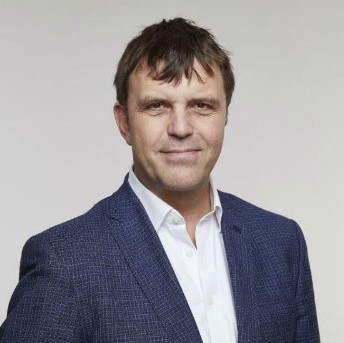


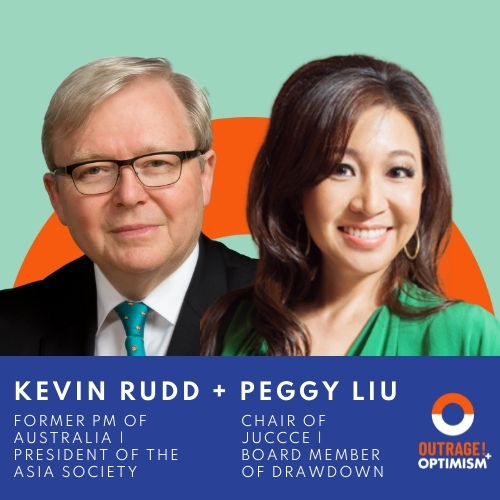
.jpg)
